Concerned Friend Is Wracked By Guilt After Calling Animal Control On Her Friend Who Kept Her Elderly Dog In Terrible Conditions Towards The End Of Its Life
The one thing animal owners can agree on is that our animal companions do not live nearly long enough. Yes, more than a decade is a long time, but it's not enough time to spend with a beloved pet.
However, for however long they live, our vow is to give them the best and happiest life possible while they are in our care. OP's friend, Sara, was a loving owner of her 14-year-old dog, Abby.
Sara and Abby have been inseparable for as long as OP can remember. Lately, Sara has been talking about her elderly dog's deteriorating state.
She told OP that Abby was having trouble going outside, she was soiling herself all the time, and she was barely eating and couldn't really stand up. OP knew Abby wasn't going to last long, and Sara knew this too, but she was doing everything to avoid it.
OP understood where Sara was coming from because she had seen how much her friend loved her dog. OP knew this was going to be a difficult time in both Sara and Abby's lives.
So, OP decided to drop by Sara's house after two months of not visiting. What welcomed OP at Sara's house was both shocking and upsetting.
The moment OP stepped into the house, an unbelievable scent wafted, and her eyes began to water
OP could smell dog waste emanating from all over the house. Sara immediately went to Abby's bed to say hello to her, and OP saw Abby's sad state.
Sara was forcing water and food down Abby's throat and telling OP everything was fine. Upon a closer look, OP saw that Abby was covered in her own waste and was completely emaciated.
Abby was whining non-stop until Sara came over to hold her. OP was sickened and shocked by what she saw.
She could no longer hold back what she was thinking and basically told Sara that it was time to let Abby go. Sara didn't react well to what OP said and explained that Abby had been holding on for weeks, which meant she wanted to stay with her.
Sara told OP to leave the house, but OP couldn't shake what she saw. OP thought long and hard about how much longer Abby could muscle through this state.
OP called their state's animal control when she got home to report Abby's condition. OP received an angry call from Sara one morning.
Sara said OP was a hateful and cruel b*tch because animal control did come to her house. They took Abby and tried to cure her, but ultimately decided it was too late to save her life.
They humanely euthanized Abby. Sara has to go to therapy to deal with the events, and she's blaming OP.
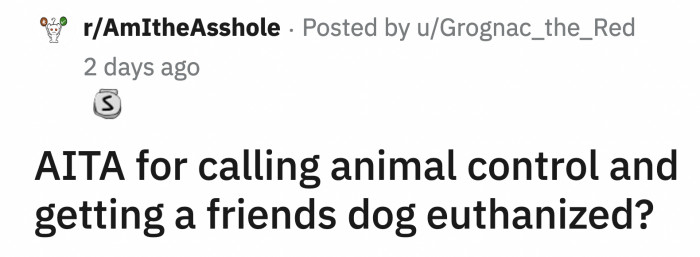
Do you think OP behaved like an a**hole? You can read the story below:
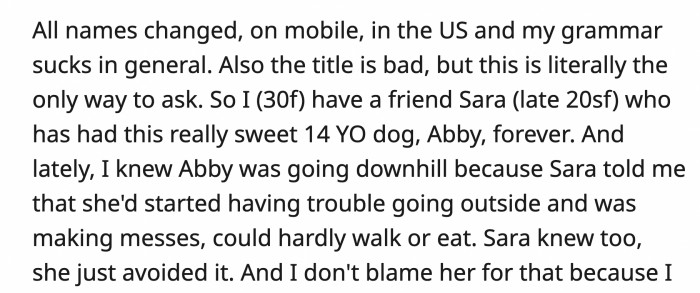
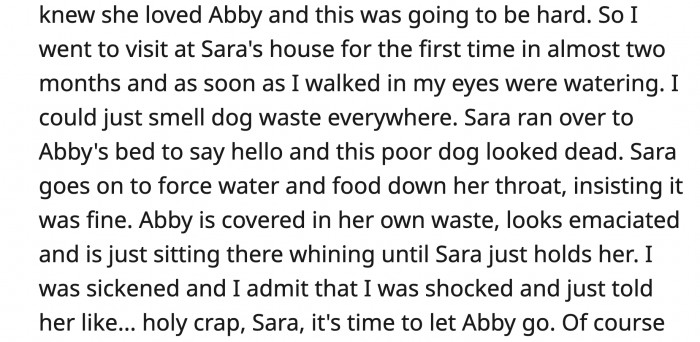
When a pet owner faces the reality of their animal's declining health, the emotional burden can be overwhelming. According to Dr. Paul Bloom, a psychology professor, "Anticipatory grief is a complex emotional response that can include feelings of sadness, guilt, and anxiety about the impending loss." This emotional turmoil can be exacerbated when owners feel they must make difficult decisions regarding their pets’ care, particularly when those decisions may involve euthanasia or intervention by animal control. Research indicates that anticipatory grief can alter one’s psychological state, impacting daily functioning and interpersonal relationships. It’s crucial for individuals in such situations to seek support, whether through therapy or support groups, to process these feelings in a healthy manner.
In the context of pet ownership and loss, it’s essential to recognize that each individual's grief journey is unique. Research from the University of California, Berkeley, indicates that social support plays a critical role in mitigating the effects of grief. Engaging with community support groups or online forums dedicated to pet loss can provide a sense of belonging and validation for those who are mourning.
Furthermore, establishing rituals to honor a pet's memory, such as creating a scrapbook or holding a small memorial, can facilitate the grieving process. These actions can help individuals process their emotions and find closure, leading to healthier coping mechanisms in the long run.
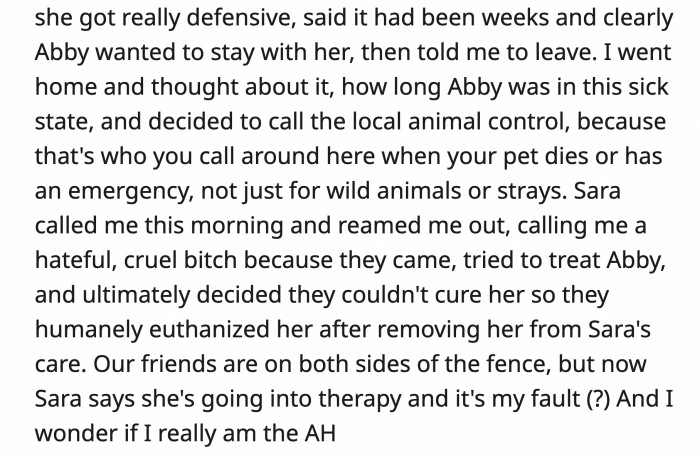
We wouldn't go as far as to call OP a hero, but she did what had to be done in that situation
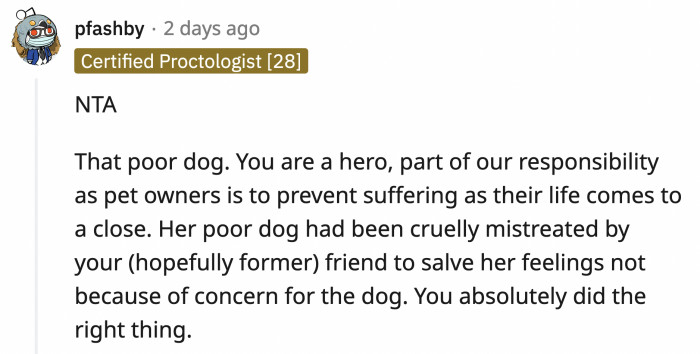
OP saw Abby dying before her eyes and couldn't allow the poor dog to suffer any longer. She overreached, and it would be understandable if this were the end of her friendship with Sara.
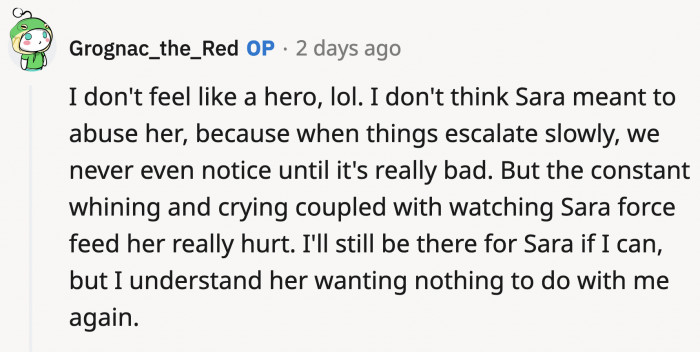
The situation described in the article may also reflect a deeper psychological phenomenon known as moral distress. Dr. Andrew Jameton, a nursing ethicist, defines moral distress as the pain experienced when one knows the right action to take but feels powerless to act accordingly. In this case, the concerned friend likely felt a profound sense of guilt after reporting her friend's treatment of Abby to animal control, believing it to be the right decision for the dog's welfare but simultaneously fearing the repercussions on her friendship.
Studies show that moral distress can lead to feelings of isolation and even burnout, particularly in caregiving roles. To mitigate these feelings, it's recommended that individuals engage in reflective practices, such as journaling or discussing their feelings with a trusted confidant. This can help them process their emotions constructively and reduce the psychological burden of moral distress.
Hopefully, therapy can help Sara process her grief

OP had the best intentions, but it really was just a bad situation to have been a part of

Animal control tried their best to save Abby, but even they couldn't rescue her from the brink of death
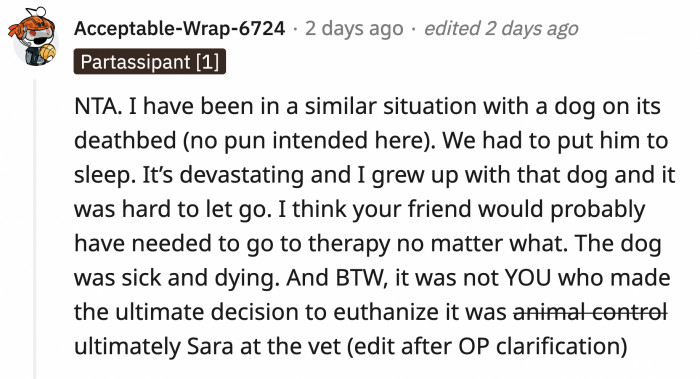
A significant factor in the emotional fallout from this situation might stem from the concept of attachment theory, which was pioneered by psychologist John Bowlby. Research into pet ownership indicates that many owners develop strong emotional attachments to their pets, often viewing them as family members. This attachment can complicate the grieving process and the decision-making surrounding end-of-life care.
According to a study published in the journal Anthrozoös, pet owners often report feeling deep emotional pain when faced with the loss of a pet, paralleling the grief experienced in human relationships. Understanding these attachment dynamics can empower friends and family members to offer more empathetic support during such a challenging time.
Sara knew deep down that it was Abby's time to go, but she just couldn't face that. What OP did forced her to confront her reality.
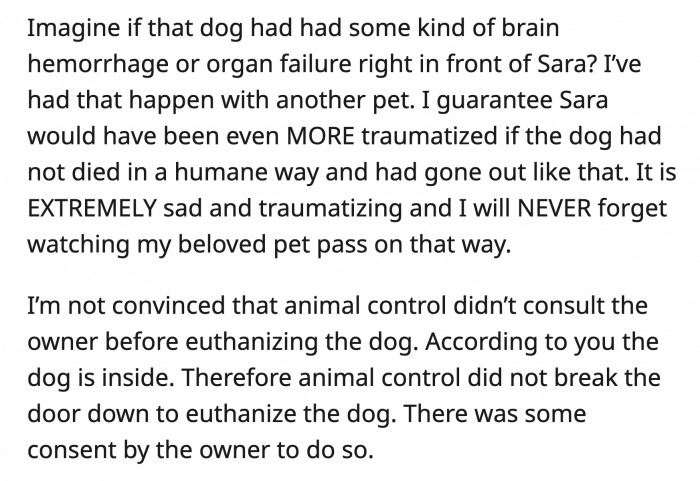
It may have been a humane process, but it is still a traumatic event to witness
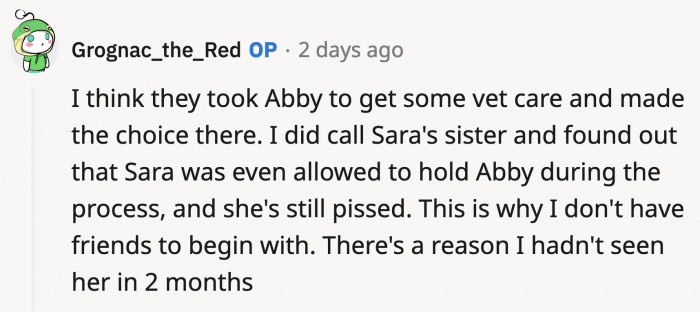
It was cruel of Sara to keep Abby in that state when she had options to ease her pain
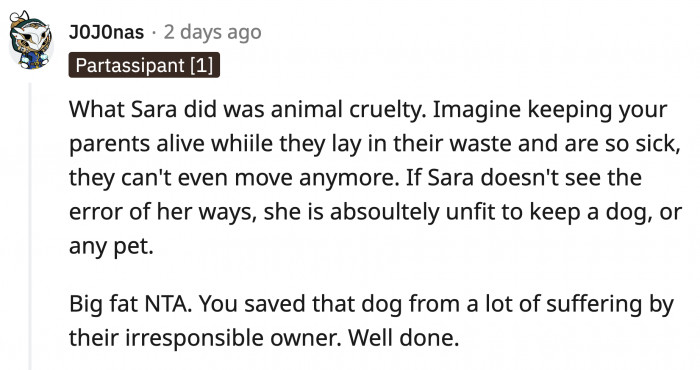
One way to support a friend grappling with guilt over their pet's care is to foster open communication that promotes emotional processing. A clinical psychologist suggests that active listening and validation of feelings can significantly help individuals navigate their emotional landscape. Research indicates that when individuals feel heard and understood, they are more likely to move toward emotional resolution and healing.
Encouraging friends to share their feelings without fear of judgment can create a safe space for healing. Techniques such as reflective listening, where one paraphrases what the speaker has said to confirm understanding, can enhance this supportive dialogue.
Someone said OP was the a**hole for making Abby face the end of her life in an unfamiliar environment alone

OP says that's not what the animal control in their state is like, and Sara was there for Abby during her final moments
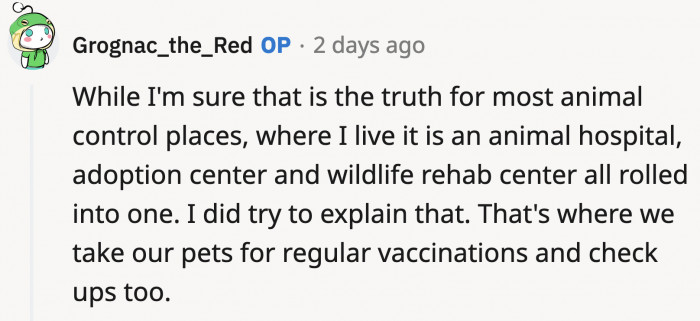
Part of being a responsible pet owner is choosing what's best for our animals until the end of their lives
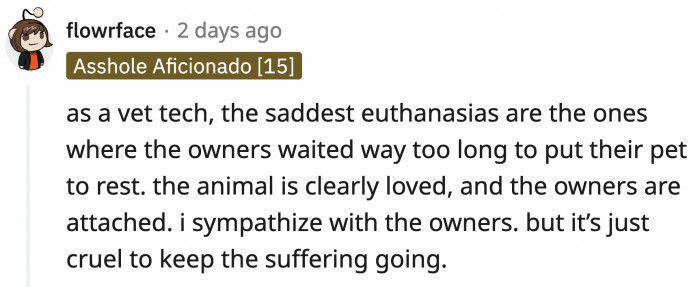
The guilt experienced by the concerned friend may also stem from a misalignment between personal values and the actions taken in the moment. Cognitive dissonance theory, developed by Leon Festinger, suggests that when individuals act in ways that contradict their beliefs—such as having to report a friend—they can experience significant psychological discomfort. This discomfort often manifests as guilt and regret.
To alleviate this cognitive dissonance, individuals might benefit from reframing their actions in a more positive light. For instance, recognizing that reporting the situation was ultimately in the best interest of the dog could help mitigate feelings of guilt. Engaging in self-compassion practices can also be beneficial, encouraging individuals to treat themselves with kindness and understanding in the face of difficult decisions.
We have no doubt that Sara loved Abby very much, but it was inhumane to keep her suffering because she wasn't ready to let go
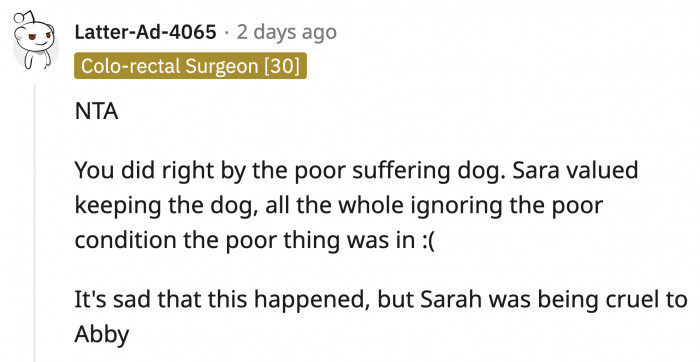
Abby's comfort should have come first, especially towards the end
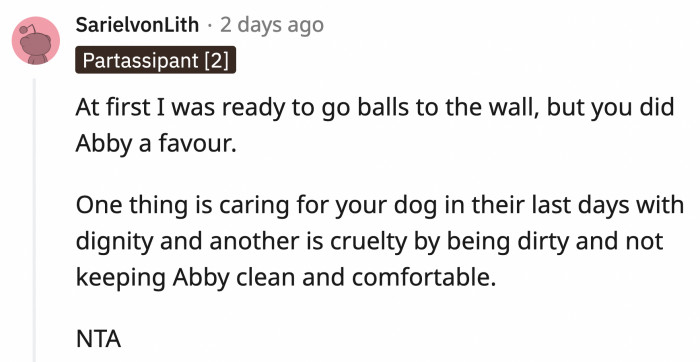
OP knew it wasn't her place to make decisions about her friend's dog. However, her conscience wouldn't allow her to sit idly by while Abby was suffering in her own filth.
OP made the right call at that time. It was a difficult decision to make, which wouldn't have fallen on OP's shoulders had Sara opened her eyes to what Abby was going through in her final days. Run free, Abby.
Psychological Analysis
Sara's behavior in this situation seems to reflect a strong case of anticipatory grief, a complex emotional response to impending loss. It's likely her deep attachment to Abby made it difficult to accept the reality of the situation, leading to denial and avoidance. OP's decision to involve animal control, while tough, demonstrates moral distress - she knew what was right but also knew it could jeopardize their friendship.
Analysis generated by AI
Healing Approaches & Techniques
Research from the National Institute of Mental Health shows that the emotional challenges faced by pet owners, particularly during end-of-life decisions, are significant and often complex. Studies indicate that addressing feelings of guilt and anticipatory grief through supportive communication and community resources can facilitate healthier emotional outcomes. The key insight is that while the loss of a pet is deeply painful, engaging in open dialogue and finding supportive networks can help individuals navigate their grief in a constructive manner, ultimately leading to healing and emotional resilience.



